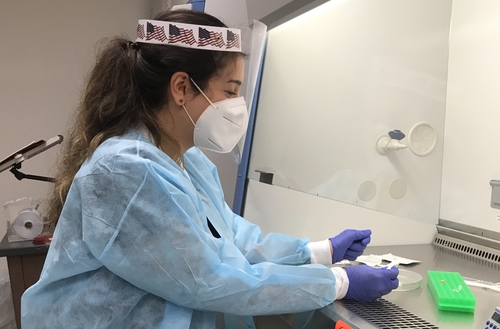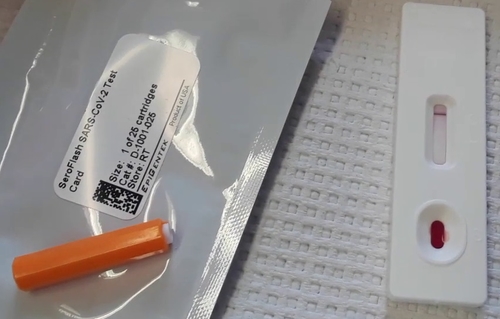
Researchers from Oakland University are studying if fingertip blood test kits — similar to the kind used by diabetics to check blood sugar — can be used to determine if individuals have COVID-19 antibodies.
The research is being conducted by Nahrain Putris, a fourth-year medical student at Oakland University William Beaumont School of Medicine, and Kenneth Mitton, Ph.D., associate professor of Biomedical Sciences, Eye Research Institute, Oakland University. It’s taking place at Oakland University’s Eye Research Institute.
The project has received Oakland University’s Institutional Review Board (IRB) and Institutional Biosafety Committee (IBC) approval.
In the first two weeks, nearly 40 people have volunteered to take part in the research that could play a big role in helping officials understand and fight the virus by producing test results in about 15 minutes. The goal is to have at least 60 people participate.
“There is a great demand for reliable testing,” said Putris. “If this test, or similar tests, prove to be reliable it would minimize having to get your blood drawn, or having to get clinical tests and sending them to central laboratories.”
“If we can find a more efficient test that would be great,” she added.
Not all tests created equal
The idea for the research project can be traced to previous gene regulation research Mitton said he’s done using products and services from a company called EpiGentek — a provider of epigenetic-related research products, technologies, and services. That work has been through his NIH/NEI-sponsored research projects.
Based on that previous experience, Mitton said he found the company’s reagents were typically reliable and specific as promised. Reagents are the main ingredient of chemical-based tests (inorganic solutions, enzymes, probes, primers, etc.) — the reason why a pregnancy test reacts to a urine sample.
In fact, the test being used in the research project underway at Oakland University (EpiGentek SeroFlash Covid19 IgG, IgM) has an appearance very similar to a pregnancy test.
The only difference?
Instead of urine, the test relies on a drop of blood from a standard finger poke to produce results in about 15 minutes. By comparison, the other primary method of antibody testing for COVID-19 requires a blood draw in a clinical setting.
“This (blood draw) process is difficult to apply to millions of people, just in Michigan alone,” states the summary of the research project.
“One possible solution would be to have a test that can be deployed to almost any site, does not require a specialized machine for test reading, and can use just a small drop of blood from a standard fingertip poke.”
However, not enough testing of the fingertip poke tests has been done, leaving their accuracy — so far, at least — questionable. Mitton admits there are many companies producing tests that simply don’t work, mostly because they lack specificity for antibodies to just COVID-19 or they generate false positive results.
Mitton said the high quality of EpiGentek’s kit reagents aren’t the only reason to believe the research project will yield useful results.
The other is that participants in the research had to previously had their blood drawn for a clinical lab analysis and had either a positive or negative result. (Individuals can also participate in the study if they’ve had a confirmed case of COVID-19, have since recovered and tested negative, or been clinically cleared by medical staff.)
Knowing that research project participants have had a clinical test for antibodies or they have had COVID-19 helps the research team to ask if this particular test is free of the false positive problem.
The EpiGentek SeroFlash Covid19 IgG, IgM test being studied by OU researchers. |
“We can have something to compare the fingertip test results to and that will help us decide if this fingertip test method is trustworthy,” said Mitton.
So far, the study has had two positive tests from individuals who had COVID-19 more than two months ago and Mitton said “it looks like the amount of COVID-19 antibodies can be relatively high or low between persons in this category.”
“So far we have not seen any false positive tests from persons who also have no antibodies based no the clinical arm draw test,” he said.
“It is important to note that while we may gain some additional information into how long after illness antibodies might be detected in some people, the main purpose of this study is to evaluate the accuracy of this particular test kit and let the results speak for themselves,” said Mitton.
Collaboration at Oakland University
Putris earned her undergraduate degree from Oakland University. As an undergrad with interest in ophthalmology, she spent a significant amount of time in the Eye Research Institute lab (she published two papers as an undergrad and began as a scholar in the Summer Undergraduate Program in Eye Research).
Also, Putris is the fourth OUWB Embark research student in Mitton’s lab and was already skilled in bench research though her research experiences in the lab.
When she learned of the opportunity to steer the current fingertip poke research project several months ago — in the early stages of the COVID-19 pandemic — she jumped at the chance. OUWB officials worked with her to create a special direct independent research elective.
Putris helped significantly with the IRB and IBC application process and is now involved in the actual testing.
“It seemed like an exciting project to me, and the opportunity to perhaps do something especially meaningful for the community during this time was exciting, as well,” she said.
In addition to the connection with EpiGentek, OU’s Eye Research Institute was a good partner on the project for another reason: space.
Specifically, the institute offered ample BSL-2 (Biosafety Level-2) work space to allow for social distancing while testing is underway. (Putris also wears a face shield, mask, gown, and other personal protection equipment, and participants must not currently have COVID-19.)
“It’s a nice environment because they can control temperature and other variables that allow for really good airflow,” she said. “It minimizes any kind of hazards that might be associated with COVID-19.”
Mitton said that such collaborations at Oakland University benefit all involved and he looks forward to more of it in the future. Mitton and Putris said they are open to the idea of letting a new OUWB medical student consider this project now underway for their own Embark program needs.
“It makes a lot of sense because you need as many hands as possible involved,” he said. “That means getting people together from different areas…physics, chemistry, biology, people from the medical school.”
“We’re all in this together,” he added.
Anyone who wishes to volunteer for the study should email research team members, and mention “Serum Antibody Research” in the subject line.
For more information, contact Andrew Dietderich, marketing writer, OUWB, at [email protected].
Follow OUWB on Facebook, Twitter, and Instagram.
NOTICE: Except where otherwise noted, all articles are published under a Creative Commons Attribution 3.0 license. You are free to copy, distribute, adapt, transmit, or make commercial use of this work as long as you attribute Oakland University William Beaumont School of Medicine as the original creator and include a link to this article.


